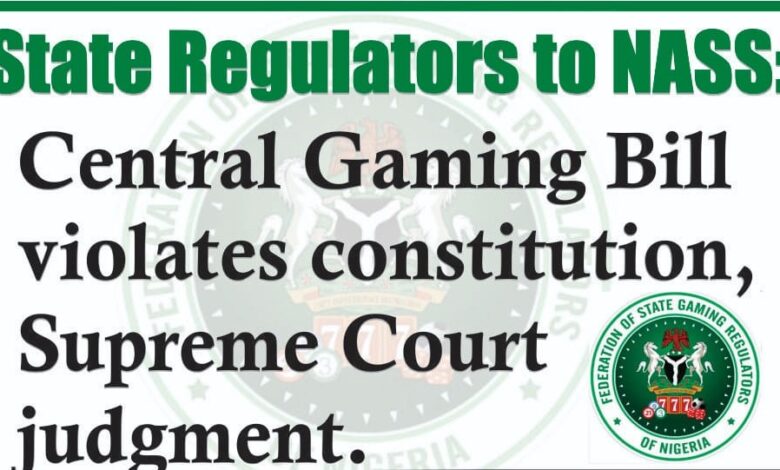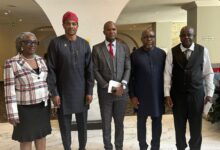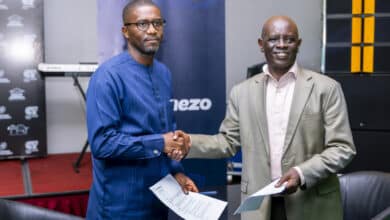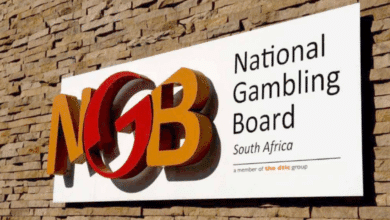The Central Gaming Bill: An Unconstitutional Overreach And A Threat To Nigeria’s Federal Structure And Rule Of Law – FSGRN

21/07/2025 Lagos, Nigeria: On behalf of the Federation of State Gaming Regulators of Nigeria (FSGRN), a collective representing the constitutional authority of twenty-four State Governments to regulate gaming, we write to express our deep and unwavering objection to the ongoing activities in the National Assembly towards the passing of the Central Gaming Bill, which has cleared Third Reading.
The Central Gaming Bill 2025 (the Bill) aims to regulate gaming activities nationwide, as it seeks to regulate the operation and business of all forms of Online and Remote gaming across the geographical boundaries of the Federating units and beyond the borders of Nigeria. Also, it will provide for the conduct of gaming in the Federal Capital Territory whilst generating revenue for the Federation.
In a country governed by the rule of law and a written Constitution, any legislative action that disregards the clear pronouncements of the Supreme Court is not only unlawful but a dangerous erosion of constitutional provisions. This is precisely the risk posed by the Central Gaming Bill currently before the National Assembly.
KEY PROVISIONS OF THE CENTRAL GAMING BILL 2025
1. Regulatory Framework: The Bill proposes the establishment of a federal regulatory framework for gaming activities, including both online and remote gaming in Nigeria, which will cut across all online games and lotteries. It will also register and certify all online and remote gaming, technology vendors, suppliers and service providers doing business in Nigeria.
2. National Gaming Commission: The Bill proposes the establishment of the Central Gaming Commission (the commission) to oversee, regulate and administer the operation of online and remote gaming activities in Nigeria.
3. Licencing and Permitting: The Bill permits the Commission to issue licence and permit to qualified operators to carry out the business of online and remote gaming in Nigeria.
BACKGROUND: THE SUPREME COURT HAS SPOKEN
On 22nd November 2024, the Supreme Court of Nigeria in suit No. SC/1/2008 Attorney General of Lagos State & Ors. vs. Attorney General of the Federation & Ors delivered a landmark judgment on the long-standing legal dispute between the Federal Government and the State Governments regarding the appropriate tier of government Constitutionally empowered to regulate lottery and gaming activities in Nigeria.
In that decision, the Court in pages 67 & 68 of the judgement emphatically declared that lottery and gaming are not matters listed in either the Exclusive or Concurrent Legislative Lists of the 1999 Constitution (as amended). Rather, Gaming and Lottery are items within the Residual Matters, meaning only State Governments have the Constitutional authority to legislate and regulate such activities within their territories.
The Court went further in page 70 to nullify the National Lottery Act and issued perpetual injunctions restraining the Federal Government of Nigeria and its agencies from attempting to regulate or control the gaming industry within the States. In other words, the Supreme Court closed the door firmly and finally on the National Assembly intrusion into the gaming space, except within the Federal Capital Territory. The verdict of the supreme court is clear and unambiguous. The court declared as follows:
1. A DECLARATION is made that lottery or game of chance is not one of the 68 items in the Exclusive Legislative List in Part I to the Second Schedule to the Constitution of the federal republic of Nigeria 1999 (as amended) (“the 1999 Constitution) in respect of which the National Assembly has the vires to make laws for the whole of Nigeria and not incidental or supplementary to any matter mentioned in the list.
2. A DECLARATION is made that having regard to the clear provisions of Section 4(2) and (3) of the Constitution of the Federal Republic of Nigeria, 1999 (as amended) (“the 1999 Constitution”) the National Assembly lacks the vires to legally and Constitutionally make any law to regulate and control the operation of lottery in Nigeria.
3. A DECLARATION is made that having regard to the clear provisions of Section 4(4)(a), (b) and Part II of the Second Schedule of the Constitution of the Federal Republic of Nigeria, 1999 (as amended) (“the1999 Constitution”), matters relating to lottery do not fall within items which the National Assembly and the state house of assembly are concurrently empowered to make laws with regard thereto.
4. A DECLARATION is made that having regard to the clear provisions of Section 4(7)(a) and (c) of the
Constitution of the Federal Republic of Nigeria, 1999 (as amended) (“the 1999 Constitution”), the Lagos State Government (represented by the 1st Plaintiff) and the 2nd – 22nd Plaintiffs’ State, have the power, to the exclusion of the 1st and 2nd Defendants, to make laws to regulate and control the operation of lottery within their States.
- A DECLARATION is made that having regard to the clear provisions of Section 4(4)(b), (7)(a) and Section 299(a) of the Constitution of the Federal Republic of Nigeria, 1999 (as amended) (“the 1999 Constitution”, the power of the National Assembly to make laws to regulate and control the operations of lottery is limited by the 1999 Constitution to only the Federal Capital Territory.
6. A DECLARATION is made that Sections 17, 18, 19, 20 and 21 of the National Lottery Act N145, Laws of the Federation of Nigeria, made by the National Assembly are inconsistent with the provisions of the 1999 Constitution.
7. A DECLARATION is made that the National Lottery Act, N145, Laws of the Federation of Nigeria is inconsistent with the provisions of the 1999
Constitution.
- AN ORDER is made nullifying the entirety of the National Lottery Act CAP N145, Laws of the federation of Nigeria.
- AN ORDER of perpetual injunction is made restraining the 1st Defendant either by himself, agents, privies, agencies of the Federal Government of Nigeria or Federation of Nigeria, or through anybody acting on their behalf from implementing the provisions of Sections 17, 18, 19, 20 and 21 of the National Lottery Act CAP N145, Laws of the Federation of Nigeria, within the territory of the States of the Plaintiffs.
10. AN ORDER of perpetual injunction is made restraining the 1st Defendant either by Himself, agents, privies, agencies of the Federal Government of Nigeria or Federation of Nigeria, or through anybody acting on their behalf from taking any step or actions aimed at enforcing or continuing to enforce any/or all of the provisions of the National Lottery Act CAP N145, Laws of the Federation of Nigeria, within the territory of the states of the plaintiffs.
ONLINE GAMING IS NOT A FEDERAL EXCEPTION
A key argument advanced by proponents of the Central Gaming Bill is that the gaming industry has moved online and therefore requires a centralized regulatory framework. This line of reasoning was canvassed before the Supreme Court in page 28 of the celebrated judgement. The Supreme Court carefully reviewed the arguments presented by the parties and adopting the issues formulated by the Defendants ( AG, Federation & National Assembly) in resolving the issues in dispute agreed with the submissions of the Plaintiffs ( AG, Lagos & ors) that the State laws governing lottery and gaming activities adequately addressed and incorporated provisions for online lottery and Gaming activities rendering Federal intervention unnecessary and unwarranted. The Supreme Court held that the States retain exclusive powers to regulate gaming, regardless of whether such games are conducted in physical outlets or through digital platforms.
The Court’s position is consistent with long-established Constitutional principles to the effect that the fact that an activity is carried out online does not automatically bring it under federal jurisdiction. The internet does not invalidate State laws or strip States of their constitutional powers.
THE INEXTRICABLE LINK BETWEEN LOTTERY AND GAMING:
Legally, lottery and gaming are not separate species but rather exist within the same genus of “games of chance.” According to the Oxford and Black’s Law Dictionaries, a lottery is defined as a scheme or game where participants give something of value for a chance to win a prize based purely on luck or random selection and not skill. This foundational attribute “chance-based selection of winners in exchange for consideration”is the exact criterion that defines not just lotteries but also betting, online casino games, and similar digital “gaming” innovations. This definition was also adopted on page 44 of the reference judgement.
The Supreme Court’s decision in AG Lagos State v. AG Federation (2024) at different times used both words joint “lottery and gaming activities” (page 58, 59) and we are of a firm opinion that the Supreme Court adopted Lottery as a generic name for all gaming activities.
Thus, all such schemes, whether physical or online, fall under the same legal umbrella. They are forms of gambling, or more precisely, games of chance, and must be regulated as such. Attempting to isolate “gaming” from “lottery” is not only artificial, but it ignores centuries of global jurisprudence that classify them jointly.
Read Also: Rachel Mijiga on Building a Regulated and Investor-Ready Gaming Market in Malawi
The Supreme Court’s decision in AG Lagos State v. AG Federation (2024) dismissed the argument that the federal government could regulate these activities under the guise of digital commerce or economic development. Instead, the Court emphasized that these are games of chance, not commercial transactions and are therefore residual matters within the exclusive jurisdiction of the states irrespective of the mode of play.
The proposed Central Gaming Bill 2025 is nothing more than a repackaged version of the now-nullified National Lottery Act 2005. Both Acts seek to establish federal control over the same subject matter: games of chance through licensing, regulation, and enforcement by a federal commission. This legislative tactic of substituting the term “lottery” with “gaming” does not alter the constitutional reality, neither term is listed in the Exclusive or Concurrent Lists of the 1999 Constitution. As such, both remain outside the National Assembly’s legislative competence.
The Central Gaming Bill: A Constitutional Aberration
Despite the Supreme Court’s clear pronouncement, the National Assembly has moved ahead to introduce the Central Gaming Bill, a legislative attempt to reassert National/federal control over gaming. This move is an affront to judicial authority, a misreading of the Constitution of the Federal Republic of Nigeria, 1999 (as amended), and a legislative misadventure that must be halted.
First, the Supreme Court has already declared that the National Assembly lacks the vires to legislate on lottery and gaming beyond the FCT. To proceed with a new bill seeking the same regulatory control previously invalidated by the Supreme Court is tantamount to legislative defiance. It is an attempt to legislatively override the Supreme Court’s decision, which is binding on all authorities in the Federation under Section 287(1) of the Constitution of the Federal Republic of Nigeria, 1999 (as amended), page 68 of the reference judgement.
Second, the argument that the online nature of gaming justifies federal intervention has already been rejected by the Supreme Court. The Supreme Court’s ruling is crystal clear: the method of transmission (physical or digital) does not change the constitutional character of gaming as a Residual Matter, page 67 of the reference judgement.
Third, the continuation of this legislative effort sets a troubling precedent. If the National Assembly is allowed to use the excuse of digitalization to override State control over Residual Matters, there would be no stopping of future federal takeovers of other sectors that are Constitutionally under the legislative competence of States. Nigeria’s federal structure would be forever destroyed, page 31, 47 of the reference judgement.
Global Gaming And Lottery Practices
Across federal systems worldwide, from the United States of America (USA) to Germany, Canada, Switzerland, South-Africa and India; effective gaming regulation is anchored in state-led frameworks that respect constitutional autonomy and regional diversity. Internet was invented in United States of America (USA) initially via ARPANET project. Instructively, this does not strip States of its Constitutional rights merely because commerce occurs online: Nigeria, being a country practicing federalism must follow suit.
The 2024 Supreme Court judgment reaffirmed that gaming falls under State jurisdiction, providing a clear path for cooperative federalism through platforms like the Federation of State Gaming Regulators of Nigeria (FSGRN). Calls for a Central Gaming Act in 2025 are not only unconstitutional but also ignore both judicial precedent and best global practices.
Conclusion
The Central Gaming Bill is, in every material respect, ill-advised and unconstitutional. It is a direct challenge to the authority of the Supreme Court, the provisions of the Constitution of the Federal Republic of Nigeria, 1999 (as amended) and a breach of Nigeria’s federal structure. Respect for the Constitution and the finality of Supreme Court decisions is the bedrock of any endearing democratic society.
We are of firm opinion that the recent actions of the National Assembly towards clearing of the Central Gaming Bill for the third reading is fundamentally flawed and reflects a misinterpretation of the applicable legal provisions in the 1999 Constitution of the Federal Republic of Nigeria as Amended
We urge and plead that the National Assembly should exercise constitutional responsibility and obligation to uphold Constitution of the Federal Republic of Nigeria, strengthen the rule of law and respect the Supreme Court Pronouncement.
SIGNED
FEDERATION OF STATE GAMING REGULATORS OF NIGERIA(FSGRN)
Abia State Delta State Kaduna State Ondo State
Akwa Ibom State Ebonyi State Kano State Osun State
Anambra State Edo State Kogi State Oyo State
Bayelsa State Ekiti State Lagos State Plateau State
Benue State Enugu State Nasarawa State Rivers State
Cross River State Imo State Ogun State Taraba State






















